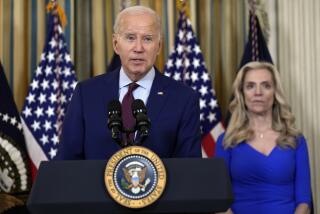Officials Agree on Steps to Open Japan’s Markets
- Share via
BIRMINGHAM, England — On the fringes of the Group of 8 summit here, Japanese and U.S. officials agreed Friday on a series of measures aimed at opening new sectors of Japan’s huge domestic markets to greater international competition.
The steps, which U.S. officials predicted would bring billions of dollars of new sales opportunities to American companies, include Japanese pledges to cut non-tariff barriers in five areas: telecommunications, housing, financial services, retail distribution and medical devices and pharmaceuticals.
“We have taken a constructive step forward in our trade relationships with the Japanese,” U.S. Deputy Trade Representative Richard Fisher told reporters.
The agreement came as part of an ongoing U.S.-Japanese initiative launched last year to deregulate and liberalize markets. While Americans are expected to win greater access to the world’s second-largest national market, Japan hopes that an easing of restrictive measures might help stimulate its sluggish economy.
In Japan’s $128-billion-a-year telecommunications market, for example, Tokyo has agreed to significantly reduce the high rates that Japan charges for connecting to local service providers by the turn of the century. At present, a highly regulated market has kept connection rates three to four times the industrialized world’s average, U.S. officials said.
“We know there is a gap . . . and the purpose is to bring it down to parity,” Fisher said.
He said agreements to open Japan’s housing materials market to U.S. products “should result in about $1 billion of additional sales for American companies.”
In a separate statement, the two nations also agreed not to tax or impose “unnecessary regulations or restrictions on electronic commerce.” The concept of electronic commerce, essentially doing business by computer, is viewed as an engine of economic growth in the next century.
The U.S.-Japanese agreements came as President Clinton met privately with Japanese Prime Minister Ryutaro Hashimoto to review Japan’s efforts to revive its economy. Appearing together after the meeting, Hashimoto smiled, joked with reporters and, at one point, called Clinton his “big brother.”
“He is the big brother to me, so I will listen to . . . advice from my big brother,” Hashimoto said. Then, looking at Clinton, he added, “Although he doesn’t look that old.”
More to Read
Sign up for Essential California
The most important California stories and recommendations in your inbox every morning.
You may occasionally receive promotional content from the Los Angeles Times.













